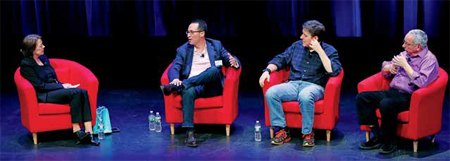NYC Entrepreneurship Night Talks Cybersecurity

From left to right: Dean Mary C. Boyce, David Aronoff, Ben Fried ’88CC, and Professor Salvatore J. Stolfo (Photo by Michael DiVito)
Cybersecurity was the headline topic at Columbia Engineering’s NYC Entrepreneurship Night, where students, alumni, and faculty also got a glimpse at some of the exciting new startups from Columbia entrepreneurs. The event, cosponsored by Columbia Engineering and the Columbia Alumni Association, was held on March 12 at the AXA Event & Production Center in Midtown Manhattan.
After an introduction from Richard Witten, trustee emeritus and special adviser to the President of Columbia University, Dean Mary C. Boyce moderated a wide-ranging conversation on cybersecurity with three technology leaders: David Aronoff, general partner at Flybridge Capital Partners and a renowned tech investor; Ben Fried ’88CC, chief information officer at Google and a member of Columbia Engineering’s Board of Visitors; and Salvatore J. Stolfo, professor of computer science and head of the Columbia University Intrusion Detection Systems Lab.
“Nothing recorded on a computer can ever truly be safe or truly be private,” said Stolfo.
Aronoff drew a distinction between the often conflated notions of security and privacy. “There’s some element of voluntarism to private information,” he said. “The security side is much more straightforward than privacy, which is more amorphous.”
The speakers argued that protecting the firmware or software of the embedded devices making up the emerging “Internet of Things,” as household items become increasingly computerized, is a key challenge moving forward.
“The Internet of Things is the next great frontier in cybersecurity,” said Fried, who studied under Stolfo as a student at Columbia. “Devices are too cheap to have good security at the rate we’re moving.”
The speakers discussed innovative responses to online security threats in the age of ubiquitous mobile devices, ranging from continuous identity verification based on behavioral patterns to hiding sensitive information in a thicket of obfuscating junk data. They agreed that, in addition to the technical challenge of devising novel defenses against online adversaries, users themselves must learn to prioritize data security.
“People are one of the more fundamental problems with cybersecurity,” Stolfo said. “People often see it as an obstacle to getting their work done.”
After a lively Q&A, the evening continued with a session featuring demos from some of the many entrepreneurial ventures from the Columbia Engineering community. Two of them, Allure Security Technology Inc. and Red Balloon Security Inc., bring advances from Stolfo’s lab to the cybersecurity marketplace. Stolfo cofounded Allure with Angelos D. Keromytis, associate professor of computer science and director of the Network Security Lab, who is currently on leave working with the Information Innovation Office at DARPA, part of the U.S. Department of Defense. Red Balloon was cofounded by Stolfo and PhD candidate Ang Cui.
Other demos spanned a broad range of market applications. Columbia Startup Lab member OnTarget, cofounded by Niran Shrestha MS’13, offers real-time project analytics for construction. With expertise in natural language processing from SEAS PhD candidates Bob Coyne BS’80, MS’09 and Daniel Bauer MPhil’13, WordsEye (also part of the Columbia Startup Lab) empowers users to generate three-dimensional scenes based on simple descriptions, like next-generation emojis. Text IQ aims to accelerate legal work with state-of-the-art natural language processing techniques, while startup KISI expands access control management of physical space with a cloud-based app.
Others who demonstrated their innovative plans included Kinnos Inc., a startup cofounded by biomedical engineering senior Jason Kang and partners Katherine Jin and Kevin Tyan from Columbia College; and deCervo, cofounded by postdoctoral research scientist Jason Sherwin and PhD candidate Jordan Muraskin BS’07, MS’11, MPhil’14, with Paul Sajda, professor of biomedical engineering, of electrical engineering, and of radiology, as an adviser. Kinnos has been widely acclaimed for its innovative, low-cost powdered bleach additive that aids in decontamination of infectious diseases, including Ebola. The company deCervo integrates brain imaging and big-data algorithms to better understand decision making in crucial moments.
“Nights like these tap into the strong entrepreneurial spirit of Columbia students and alumni from around the world,” Boyce said.
